This article may contain affiliate links. Please see our affiliate disclaimer in the footer menu for more information. Thank you for your support!
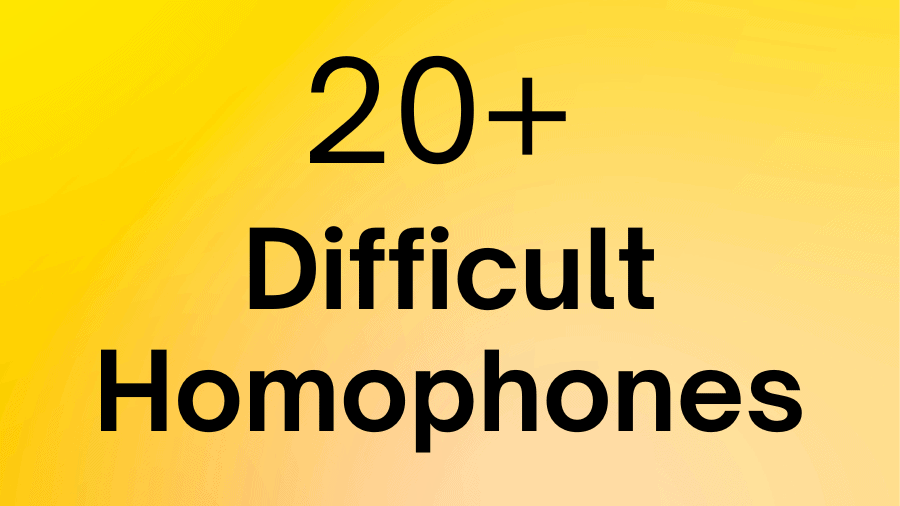
English is a complex language, and one of the most confusing elements for native and non-native speakers is the realm of difficult homophones.
As a proofreader who has corrected many homophone hiccups, I can help you differentiate between some similar-looking terms so you can do the same.
We’ll discover what constitutes a homophone and then delve into some challenging ones.
What Is a Homophone?
Let’s dig into a reliable dictionary for an expert definition of the word homophone:
“Homophones are words that sound the same but are different in meaning or spelling.”
– Merriam-Webster.com Dictionary
And homophones are words that slide right past spellcheckers.
Spellcheckers can detect if a term is misspelled, but they can’t determine if a correctly spelled word is used in the wrong context.
Or as the copy chief of Random House cleverly tells us,
“Spellcheck is a marvelous invention, but it can’t stop you from using the wrong word when the wrong word you’ve used is a word (but the wrong word).”
– Benjamin Dreyer, Dreyer’s English: An Utterly Correct Guide to Clarity and Style
Homophones occasionally allude elude grammar checkers too.
The English language contains a whole host of homophones. Or should I have written a hole host of homophones?
You already know we use the word whole to mean entire or complete and hole to refer to what we dig with a shovel. So whole and hole are homophones you’ve already hacked. Nice!
Although proofreaders and copy editors are the ones who must pay particularly close attention to homophones, anyone who reads or writes can benefit from learning to differentiate between these sets of confusing words.
Using the wrong term in writing causes our audience to trip over our words.
And if you’re a reader who misinterprets the meaning of a term, it can leave you wondering what the author meant.
Let’s see a few examples of homophones you probably encounter regularly:
- affect vs. effect
- bear vs. bare
- cede vs. seed
- dear vs. deer
- eight vs. ate
- flew vs. flu
- gait vs. gate
- hair vs. hare
Although homophones of all kinds cause problems for native and non-native English speakers, this article will focus on hard-to-remember homophones that frequently cause hangups.
I’ll give you some pointers along the way to help you remember these easy-to-confuse words.
Hopefully these hints will heal your homophone hiccups and headaches!
Difficult Homophones (Definitions and Examples)
Onto the homophones! I’ve arranged them in alphabetical order for easy reference. And remember to try the quiz at the end to ensure you’ve mastered these words!
1) Aisle vs. Isle

Aisle: a narrow passageway between objects (e.g., a group of seats in an auditorium)
I have a friend who likes to go down every aisle in the grocery store to ensure she doesn’t forget anything. (True story! 😉)
Isle: an island (typically a small one)
David admired the exquisite turquoise water as he walked along the isle’s shoreline.
Memory Tip: The first three letters of isle and island are the same. Easy enough.
2) Allude vs. Elude
Allude: to refer to something indirectly
The smirk on her face alluded to her mischievous behavior.
Elude: to avoid or escape
The reason for his strange behavior continues to elude her.
3) Allusion vs. Illusion
Allusion: a roundabout reference to something
The children’s book seemed to feature allusions to the author’s favorite childhood activities.
Illusion: an image or belief that’s misleading or deceptive
Have you ever been fooled by an optical illusion that makes straight lines appear curved?
Memory Tip: Some optical illusions will make you ill (dizzy) if you stare at them too long.
4) Ascent vs. Assent
Ascent: going upward, an incline
The hikers calculated that their ascent up the mountain would take approximately three hours.
Assent: agreement or approval
Susan gave her assent to the new proposal.
5) Censor vs. Sensor
Censor: suppress or cut out unsuitable material
The website owner had to censor inappropriate language in a guest post since his site caters to children.
Sensor: a device used for detecting something (e.g., movement, light, sound)
The alarm will sound if the sensor detects motion in certain rooms of the house.
Memory Tip: Sensor, like sense, starts with an s. A sensor’s job is to sense (detect) something.
6) Chord vs. Cord
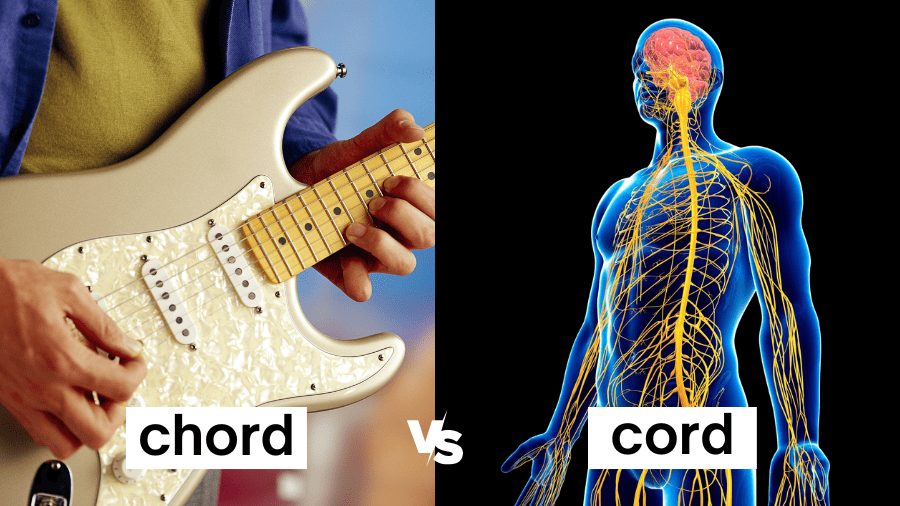
Chord: several musical notes played together
The guitar teacher taught his students how to play a few basic chords.
Cord: a rope-like structure or an anatomical feature
Julia refrained from screaming at the concert because she didn’t want to strain her vocal cords.
7) Complement vs. Compliment
Complement: something that completes or improves something else
She wears lots of neutral tones, so her new mustard yellow purse was the perfect complement to give her wardrobe a pop of color.
Compliment: an expression or act of praise or admiration
Giving someone a genuine compliment is a sure way to lift their spirit.
Memory Tip: The first six letters of complement are two letters short of spelling complete. It also helps to think this thought: a compliment (with an i) is something I tell you.
8) Council vs. Counsel
Council: a group of people that gives advice or makes decisions
The city council discussed budgeting concerns at last night’s meeting.
Counsel: advice or guidance to help someone
Therapists provide counsel to clients who are going through hard times.
9) Descent vs. Dissent
Descent: going downward, a decline; someone’s ancestry
The abundance of roots on the steep trail made the hiker’s descent treacherous.
Dissent: a disagreement or not granting approval
During the meeting, an employee voiced his dissent over the unfair treatment of his colleagues.
10) Discreet vs. Discrete
Discreet: displaying good judgment or tact
The manager provided discreet correction to an employee by correcting him behind closed doors.
Discrete: a separate or distinct element
Every drink ordered at Starbucks gets a discrete label indicating how the beverage should be made.
11) Dual vs. Duel
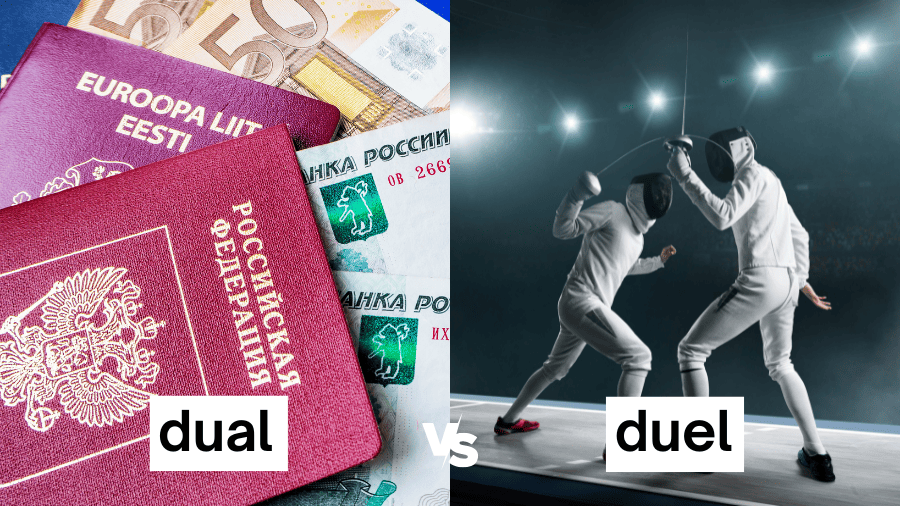
Dual: possessing two parts or aspects
Isabella obtained dual citizenship—she’s a citizen of Italy and the United States.
Duel: a battle or conflict between two people
The duel between the two rappers highlighted their ability to come up with catchy rhymes on the spot.
12) Elicit vs. Illicit
Elicit: to bring to mind or draw something out
The therapist asked insightful questions that elicited detailed and revealing responses from the client.
Illicit: against the law
Jail time is a possible consequence for people caught engaging in illicit behavior.
13) Hoard vs. Horde
Hoard: a stash or supply someone stores or hides
The prepper showed his neighbor the hoard of water, canned food, and first aid supplies he had been collecting in his basement for the past five years.
Horde: a big, unorganized group; a tribe
An eager horde of shoppers waited outside the hardware store to take advantage of the Black Friday deals as soon as the doors opened.
14) Incite vs. Insight
Incite: to provoke someone to act
The speaker’s inflammatory remarks incited violence among the listeners.
Insight: an in-depth understanding of a person or situation
Ingrid’s impressive insight into human nature enabled her to write a best-selling psychology book.
Memory Tip: The word insight ends in sight and involves being able to see into a situation intuitively.
15) Lightening vs. Lightning
Lightening: to make lighter in color, weight, or spirit
He helped the older lady carry groceries to her car, thus lightening her load substantially.
Lightning: a bright flash of light produced during a thunderstorm
She was mesmerized by the lightning bolts that illuminated the inky black sky.
16) Palate vs. Palette
Palate: the roof of one’s mouth; one’s taste (as in preferences) regarding food and aesthetics
The restaurant’s varied menu appeals to a wide range of palates.
Palette: a board used for holding paint colors, what Bob Ross used 😊
Bob Ross masterfully mixed magnificent shades of green on his palette prior to painting happy little trees.
Memory Tip: Palate contains the word ate, which relates to one’s taste and one’s mouth. Well, for the most part, right?
17) Peak vs. Pique
Peak: the highest point of something
The hikers aimed to reach the peak of the mountain before dusk.
Pique: to excite or awaken (usually an emotion)
Hearing about Dave’s mushroom foraging adventures in Gothenburg piqued Ellen’s curiosity about the kinds of mushrooms growing near her home in South Carolina.
18) Pedal vs. Peddle

Pedal: using the feet to press down on levers that control objects (e.g., bikes, cars, pianos)
The little boy was learning how to pedal his new tricycle.
Peddle: to go from one place to another selling goods
Many street vendors peddle handmade jewelry on the streets of San José, Costa Rica.
19) Precede vs. Proceed
Precede: to come before in time or rank
Careful consideration usually precedes a difficult decision.
Proceed: to keep moving forward by making progress; to arise from an origin
Vanessa decided to proceed with her original plan despite the unexpected interruption.
Memory Tip: The prefix pre means before. We find it in words like preview and preheat.
20) Reek vs. Wreak
Reek: to give off a strong (usually offensive) odor
Durian, a fruit widely consumed in Southeast Asia, is known to reek of smelly gym clothes or garbage.
Wreak: to inflict a negative consequence upon an entity
A negative mindset can wreak havoc on one’s ability to achieve their goals.
21) Reign vs. Rein
Reign: to have dominion over
Grammarly continues to reign supreme as the best proofreading software on the market.
Rein: to keep in check by restraint; a strap used to control an animal (e.g., horse reins)
The teacher was able to rein in the students’ disruptive behavior by incentivizing them with a reward for good conduct.
22) Shear vs. Sheer
Shear: cutting something off or trimming something back
Some gardeners use hand pruners to shear their plants.
Sheer: unadulterated, pure; a transparent or fine texture (like pantyhose)
The horror movie’s disturbing scene left her with a feeling of sheer terror.
Memory Tip: Shear contains the word ear, and what van Gogh did with his ear fits the definition of the word we’re discussing. I know that’s not the most uplifting memory trick, but you’ll probably never confuse these two words ever again. Like, never ever. 😉
23) Stationary vs. Stationery
Stationary: fixed in place, not moving
Since Carlos couldn’t exercise outdoors during the harsh winters, he invested in a first-rate stationary bike.
Stationery: writing materials (paper, pens, envelopes, etc.)
Her grandmother gifted her a set of stationery for her birthday to inspire her to write notes by hand.
Memory Tip: The words stationery and letter both contain –er.
Frequently Asked Questions
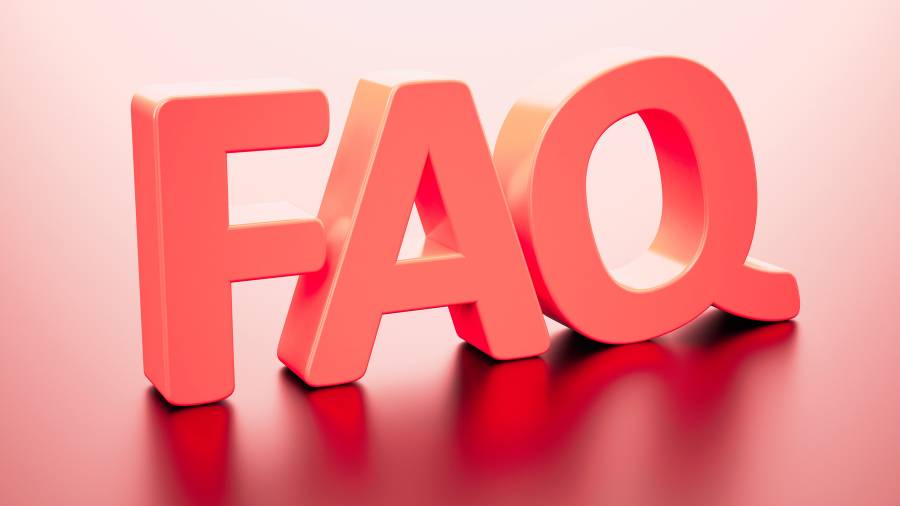
What are some common homophones?
English is chock-full of homophones; we see many of them regularly when reading or writing.
Here are just a few common homophones:
- be vs. bee
- by vs. buy vs. bye
- hear vs. here
- its vs. it’s
- there vs. their vs. they’re
- to vs. two vs. too
- which vs. witch
- your vs. you’re
What are some rare homophones?
Let’s look at a few examples of rare homophones.
- populous (heavily populated)
- populace (the common people of a specific region)
- mote (a speck)
- moat (a water-filled trench that surrounds a secure structure)
- rye (a grain that produces edible seeds, think rye bread)
- wry (twisted or crooked)
Do you think these are uncommon?
What you or I consider rare could be less rare to someone else, depending on their lexicon.
Finally, let’s see a pair of particularly rare homophones:
- grammar (the rules for how we put words together to make sentences)
- Grammer (a last name; an unincorporated community in the US state of Indiana)
Om Proofreading has an article that explains the differences between grammar and Grammer. It mentions a memory tip for how to spell grammar—the word we’re almost always reaching for in that pair—since it’s frequently misspelled g-r-a-m-m-e-r.
What are homographs and homonyms?
Homographs are words that are spelled alike but have different meanings or pronunciations.

For example, bat and bat are homographs. They have the same spelling (and pronunciation) but different meanings.
1) bat: what we use to hit a ball [noun]
2) bat: the nocturnal mammals we associate with Halloween [noun]
People disagree on whether words with the same spelling need to differ in pronunciation to qualify as homographs.
For example, some would say that bat and bat aren’t technically homographs because they sound alike.
Homonyms are words that are either homographs, homophones, or both.
Therefore, to be homonyms, words must either have the same spelling (pronunciation unimportant), the same pronunciation (spelling unimportant), or both.
However, a more limited definition requires that words be both homographs and homophones to qualify as homonyms (source).
Considering these disagreements and stricter definitions, it’s obvious why we get so confused about the differences between homophones, homographs, and homonyms.
How can I remember the difference between homophones, homographs, and homonyms?
Great question! Who doesn’t have trouble keeping these words straight? My go-to dictionary recommends focusing on the etymology (origin) of each word to remember its meaning:
“Homophone comes from the Greek -phōnos (meaning “sounding”); homograph is from the Greek graphein (“to write”); homonym is from the Greek onyma (meaning “name”).”
– Merriam-Webster.com Dictionary
I hope that helps!
Quiz: Hard to Hack Homophones
Now that we’ve mastered the meaning of some frequently mixed-up words, it’s time for you to try your hand at the homophone quiz.
Are you ready to ace the test? Let’s go! 😊
Important: After finishing the quiz, you’ll need to scroll back up the page to click the “View score” button.
I hope you’ve gained greater mastery over these difficult homophones!
Although homophones are part of English grammar, they involve the element of spelling. I penned a post about how grammar and spelling differ if you’d like to learn more.
Best wishes to you!
“When I was 5 years old, my mother always told me that happiness was the key to life. When I went to school, they asked me what I wanted to be when I grew up. I wrote down ‘happy’. They told me I didn’t understand the assignment, and I told them they didn’t understand life.”
– John Lennon
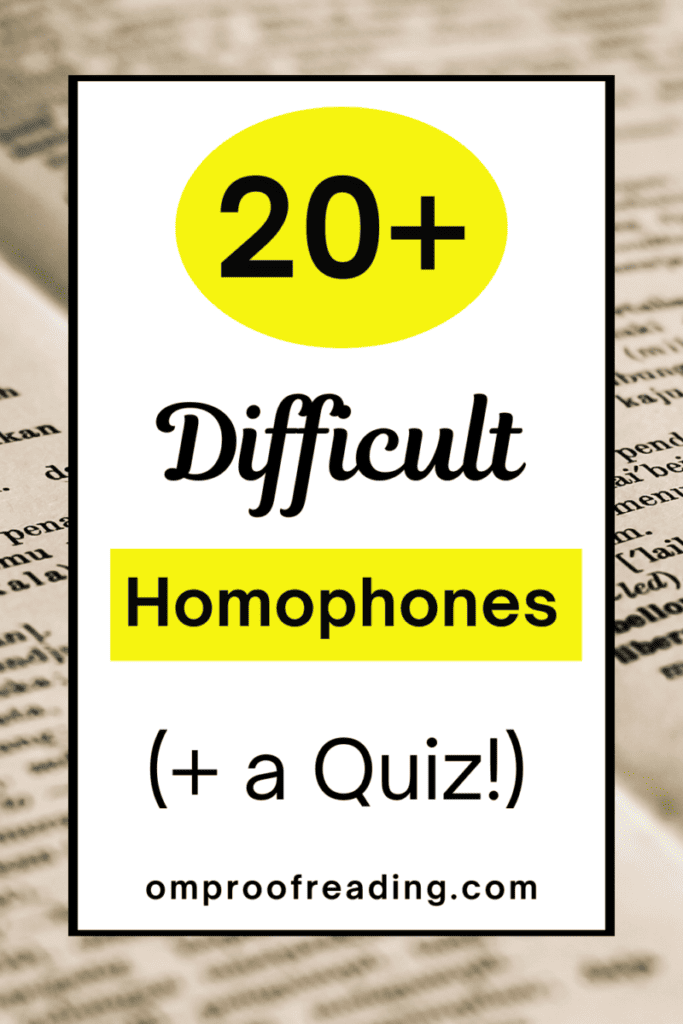
Recent Posts
Punctuation is important because it enables us to communicate our message clearly and effectively. Without punctuation, we wouldn’t understand how units of a sentence relate to one another or how...
Although you're probably somewhat familiar with adverbs, you may be unaware of sentence adverbs. As a trained proofreader who has studied the parts of speech, I can help you understand this unique...
